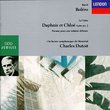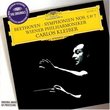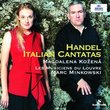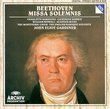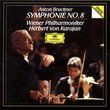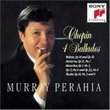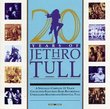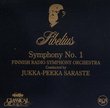| All Artists: Wolfgang Amadeus Mozart, Georg Solti, Wiener Philharmoniker, Ruth Ziesak, Uwe Heilmann, Michael Kraus, Sumi Jo, Kurt Moll, Heinz Zednik, Lotte Leitner Title: Mozart - Die Zauberflöte (The Magic Flute) Members Wishing: 1 Total Copies: 0 Label: Decca Release Date: 9/12/1991 Genre: Classical Styles: Opera & Classical Vocal, Historical Periods, Classical (c.1770-1830) Number of Discs: 2 SwapaCD Credits: 2 UPC: 028943321020 |
Search - Wolfgang Amadeus Mozart, Georg Solti, Wiener Philharmoniker :: Mozart - Die Zauberflöte (The Magic Flute)
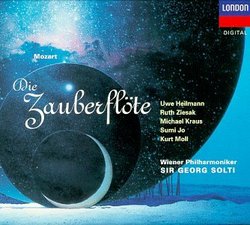 | Wolfgang Amadeus Mozart, Georg Solti, Wiener Philharmoniker Mozart - Die Zauberflöte (The Magic Flute) Genre: Classical
This will be the Magic Flute chosen by most people who want to live with just one. It finds Georg Solti in a relatively relaxed state of mind, with an excellent if not particularly famous cast, and an orchestra and chorus ... more » |
Larger Image |
CD DetailsSynopsis
Amazon.com This will be the Magic Flute chosen by most people who want to live with just one. It finds Georg Solti in a relatively relaxed state of mind, with an excellent if not particularly famous cast, and an orchestra and chorus that any conductor would give his left arm (not the one that welds the baton) to work with. The singers are not particularly well-known (London seems to have set up Solti as the star of this production) but a lack of celebrity attitudes and close attention to the conductor have paid substantial dividends in this production. Sumi Jo, in a spectacular and dramatic performance of the Queen of the Night's two arias, attracts special attention, as do Uwe Heilmann (Tamino) and Michael Kraus (Papageno). --Joe McLellan Similar CDs
Similarly Requested CDs
|
CD ReviewsImpressive _ | Lowell MA | 03/09/2000 (5 out of 5 stars) "I'm no expert on opera or on classical music, so I guess you could say my opinion is not a highly informed one. Still, I know what I like when I hear it, and I was impressed by this recording.I liked the performances of Uwe Heilmann as Prince Tamino, Michael Kraus as Papageno, and Ruth Ziesak as Pamina. But what stood out to me was Sumi Jo as the Queen of the Night. When she sang "Der Holle Rache kocht in meinem Herzen", I thought about the image I remember from the film "Amadeus" with the Queen looking like the Virgin Mary clothed with the sun (as in Rev.12:1), and singing in that rich sweet voice with the birdlike trills. Imagine my surprise when I read the text and found that she was boiling over with rage, urging her duaghter to commit murder, and threatening to invoke the vengeance of the gods if she didn't! Wow!But maybe even more memorable for me was "O zittre nicht, mein lieber Sohn", when the Queen, distraught over her daughter's kidnapping, commisions the prince to go and rescue her. Ms. Jo's singing was particularly beautiful and moving here.I could go on about the Masonic rites, and the metaphor of the Queen as Church, etc. But my expertise on opera is limited, and I think I've reached the limit of that expertise. Still, this CD is great enough to appeal even to an unsophisticated clod like me." Great Flute _ | 04/01/2003 (5 out of 5 stars) "What's the most important thing a person looks for in a Magic Flute? Frankly, if you think deeply enough, ultimately, what makes or breaks a flute is the Queen of the Night!! Yes, the most important cornerstone of a Magic Flute is the Queen of the Night. What all of us look for ultimately is the Queen of the Night because her arias are the most dazzling and brilliant in the whole opera, and indeed, is one of the most dazzling and fascinating in the whole of the opera repertoire. So this particular magic flute fulfils one of the most important prerequisites of a Magic Flute - it has an outstanding Queen of the Night, Sumi Jo. Spectacular, brilliant, dazzling and flung out with astonishing ease and accuracy in precision. Her trills are beyond belief. Whereas many outstanding Queen of the Nights, including Lucia Popp and Duetekom cheats on the trills and misses out a note here and a note there, the notes are intact in Sumi's case. The first time I heard her, I was absolutely thrilled and stunned.Of course, a weak Queen destroys a flute but a good Queen doesnot make a bad flute good. Fortunately for us, the rest of the cast is well-nigh flawless. Ziesek here sings with tremendous freshness and intelligence. She portrays what Pamina should be - a young girl with the kind of innocence so often missing in other flutes. Ziesek's characterization of Pamina here is simply outstanding. It is often the case that the role of Pamina is given to singers who sing beautifully but without characterization or emotions. So you end up with a Pamina whose arias are all beautifully executed but with not much character in them. Not so here - you hear her desperation and despair, here sincerity. This is an exceptional Pamina.The Papageno here is also outstanding and listening to the dislogue itself will have some of you in stitches. The arias are wonderfullly executed with appropriate characterization. Heilmann is also an outstanding Tamino. He is not daunted by the high tessitura of his lines and everything is wonderfully executed. Kurt Moll - well, I don't have to say anything. Like Christa Ludwig, or Elisabeth Schwarzkopf, it is hard to ever find too much fault with anything that Moll does. Here, he is, as expected, an outstanding Sarastro. Solti, of course, is the star of this production. He is often criticized for his vertical stop-go approach. Happily, his pacing in this flute is wonderfully done. The overture, in particular, is the best I've ever heard - better than Bohm or Klemperer. It springs and skips along like lambs playing and frolilcking merrily on the hillside. There is no Wagner-style heaviness and fierceness, only Mozartian lightness and humor. The Queen of the Night's arias are paced terrifically and so is the Papageno/Papagena duet. Many conductors make the mistake of pacing these arias too slowly. Solti, on the other hand, quickens the pace by a hair's breath with astonishingly good results. It's not too fast but yet not cumbersome like some other conductors. For instance, Klemperer, Bohm and even Solti in his old set paces the Papageno/Papagena duet too slowly so that while the duet is well-sung, the humor and lighter side of the duet is missing.I don't suppose I need to say anything about the Vienna Philharmonic. Those who have been in the classical circuit long enough could close their ears and with 100% assurance say that their playing is nothing short of extraordinary as usual. The celebrated combination of Solti and the Vienna Philharmonic never produces orchestral playing that is anything other than first rate. Witness Solti's ring. However much critics like to criticize Solti's direction, one thing that the critics all agree on is this - the Vienna Philharmonic plays gorgeously for Solti in his Ring. Well, you can be sure of that same high standard in this Magic Flute. Buy this!" A Beautiful Performance D. A Wend | Buffalo Grove, IL USA | 01/06/2006 (5 out of 5 stars) "I have seen Die Zauberflote (The Magic Flute) on several occasions and this recording by Sir Georg Solti has always brought back those wonderful performances. With the Mozart 250th birthday this January Gramophone magazine selected the best recordings of the opera and this Solti version was among the top choices. Sir Georg had a long association with the opera that dated back to the late 1930s when he was an assistant conductor under Toscanini. Overall, the recording has a feeling of excitement that is apparent from the overture to the concluding chorus of the final act. The dialogue is dramatically spoken and conveys a real performance with comic moments (particularly those with Papageno) coming off nicely. The Overture is beautifully played with perfect phrasing from the Vienna Philharmonic.
The casting of the parts is excellent with Uwe Heilmann as Tamino and Ruth Ziesak as Pamina, who provides a full characterization of her role down to the desperation she feels when faced with Tamino's silence. Michael Kraus makes a great Papageno but certainly does not eclipse Hermann Prey from Solti's 1969 recording of the opera. He is wonderfully comic and sings Ein Maddchen oder Weibchen with apparent joy. I was fortunate to see Sumi Jo sing the Queen of the Night and I recall the praise reviewers gave her performance. Ms. Jo gives a fabulous performance here from her first aria O, zittre nicht, mein lieber Sohn! to the well-known coloratura favorite Der Holle Rache kocht in meinem Herzen. Kurt Moll is a commanding Sarastro and Heinz Zednick is a fine Monstantos who particularly shines during his scene with Pamina. Sir Georg adopts perfect tempi and the Vienna Philharmonic respond to him with beautiful playing. His deep affection for this opera shows through the entire recording and is one that should not be missed. " |

 Track Listings (17) - Disc #1
Track Listings (17) - Disc #1


